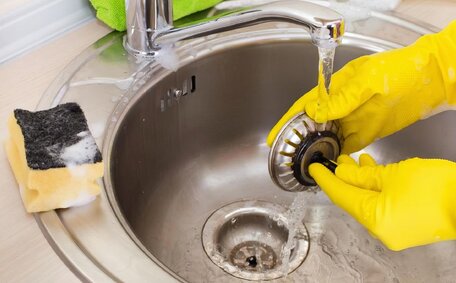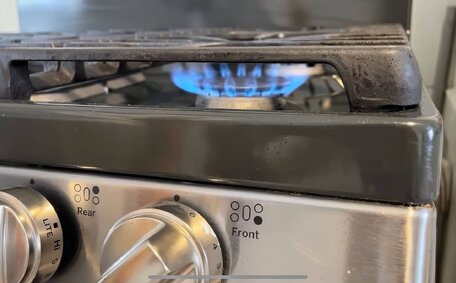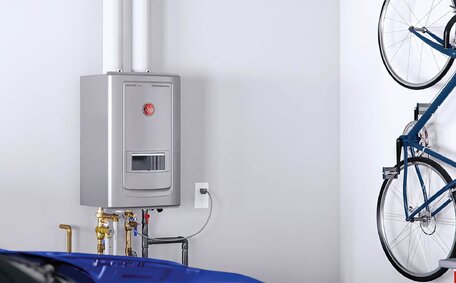Introduction to Baking Soda and Vinegar
Natural cleaning advocates often praise the combination of baking soda and vinegar as eco-friendly. Though visually entertaining, it’s essential to understand what occurs chemically when we mix vinegar and baking soda.
The common baking soda and vinegar reaction creates an effervescent display, much like a small-scale volcano.
With over a decade of service in Pennant Hills and nearby Sydney locales, our plumbing company is well-acquainted with household cleaning methods that maintain your drain using cup measures of kitchen staples. Our focus is to examine the cleaning efficacy of baking soda and vinegar together and determine if they deliver as promised.
This article assesses the true cleaning power of combining vinegar with the effervescence of baking soda. We’ll also explore alternative cleaning methods that leverage the individual strengths of both vinegar and baking soda.
The Chemistry Behind Baking Soda and Vinegar
When baking soda (sodium bicarbonate) and vinegar (acetic acid) are combined, an acidic base reaction occurs. The baking soda, with its ph level being quite high, acts as a base while the vinegar is an acid. The reaction involves acetic acid in vinegar reacting with sodium bicarbonate (baking soda), producing carbon dioxide gas.
However, the interaction between soda and vinegar is fleeting. This means the reaction ultimately neutralises itself, yielding water and sodium acetate as byproducts.
So in terms of cleaning capabilities, simply mixing baking soda and vinegar does not provide much benefit. The ingredients deactivate each other rather than persisting to clean surfaces. You mainly just get a fun foaming effect without substantial grime-fighting power.
However, using baking soda independently from vinegar can be an effective cleaning strategy.
For better results, dispensing baking soda via a spray bottle or using vinegar singly could improve cleaning efficiency rather than combining them.
The Reaction Between Baking Soda and Vinegar
The acetic acid in the vinegar reacts with the sodium bicarbonate (baking soda). This reaction produces carbon dioxide gas, which is why you see bubbling when the ingredients are combined.
As the gas is released, the baking soda mixed with vinegar in a washing machine essentially neutralises their cleaning properties. The primary remnants of this reaction, akin to some conventional cleaners, are water and sodium acetate. Despite its theatrical display, the mixture of baking soda and vinegar offers limited cleaning utility due to the deactivation of active ingredients.
Applying vinegar separately after baking soda can result in enhanced cleaning outcomes. Baking soda alone can lift stains, and vinegar, employed as a separate step, addresses water stains, mineral deposits, and grease, thanks to its dissolving properties. Rather than limiting their individual strengths by combining them, it’s better to harness their unique cleaning capabilities on their own to tackle hard water stains.
For a sluggish drain, pour a cup of baking soda down, then follow with a cup of hot distilled white vinegar.
The effervescent baking soda mixture can clean by interacting with the grease and debris, facilitating its clearance. The heat and acidity of the vinegar will cut through and further break down buildup. Allow the mixture to sit for 5-10 minutes before flushing with warm water.
Utilising baking soda and vinegar sequentially, or combining baking soda with hydrogen peroxide, aligns with eco-friendly principles and optimises their cleaning potential.
Effectiveness for Cleaning Drains
For minor grime removal, the duo of baking soda and vinegar may be of some assistance. Nonetheless, they fall short of the efficacy found in professional cleaning methods, such as high-pressure applications that directly target grime.
A paste of baking soda may aid in loosening blockages in drains, thanks to its vigorous reaction with vinegar. However, this reaction is short-lived, limiting the extent of grime removal possible.
Sprinkling baking soda followed by vinegar can help dislodge minor blockages in your toilet bowl. For more significant accumulations of sludge, grease, hair, and soap scum in the toilet bowl, more intensive cleaning methods are needed.
Additionally, our industrial-strength drain augers can tackle tough clogs from tree roots or debris, and regular maintenance with vinegar helps prevent pipe blockages.
For optimal results, consider contacting a trained local plumber versed in effective vinegar and water cleaning mixes.
Regular maintenance by our Pennant Hills drain cleaning experts helps maintain optimal drainage and prevent water damage.
Using Baking Soda and Vinegar in Plumbing
When it comes to using one cup baking soda and vinegar for plumbing, it’s important to follow proper procedures and use the right ratios for safety and effectiveness.
In domestic plumbing, a mixture of baking soda and vinegar may help clear light mineral deposits and minor clogs. However, it’s crucial not to depend on them solely, and to make sure they’re thoroughly flushed out after application.
In regions with hard water, the reaction of baking soda and vinegar can negatively affect metal pipes or fittings. The carbonic acid formed can cause corrosion over time. Therefore, a straightforward baking soda and water solution is preferable for plumbing upkeep, saving vinegar for situations that can withstand additional acid.
It’s advised against using home remedies such as baking soda and vinegar for commercial plumbing systems. These mixtures could corrode pipes, interact unpredictably with residual chemical cleaners, or dislodge debris that may clog the system further down. Professional solutions, like hydro jetting and drain cleaning, are the preferred alternatives.
Although baking soda and vinegar are effective individually, mixing them directly provides minor plumbing advantages and could harm equipment. Contact our team if you need professional drain or plumbing services.
Alternatives for Unclogging Drains
While baking soda and vinegar can tackle small clogs, stronger solutions exist for unclogging drains.
Mechanical drain cleaning by professionals yields better outcomes than DIY baking soda mixtures. High-powered jet sprayers, for instance, clean pipe interiors with intense water pressure. Industrial augers with cutting heads also actively break through tough clogs.
Enzymatic cleaners, employing bacteria to break down organic materials, are another practical choice. For a safer choice, bio-based cleaner gels are recommended.
Preventative measures like hair catchers, salt water rinses, sink strainers, and screens can prevent debris from accumulating. Regular use of baking soda and vinegar solutions, along with snaking, can reduce buildup.
Baking soda and vinegar may provide a quick fix for light drainage issues but don’t compare to the cleaning capabilities of professional Pennant Hills plumbers. Contact us for superior drain clearing services to suit residential and commercial needs.
Expert Tips for Drain Maintenance
Maintaining clear drains is crucial for preventing blockages and potential flooding in Pennant Hills homes. As local drainage specialists, we recommend the following expert tips for ongoing drain maintenance:
- Use drain strainers in sinks to catch food scraps, hair and debris before it washes down.
- To help avert clogs, pour a mix of baking soda and a tablespoon of vinegar down drains weekly, followed by boiling water. This can dislodge grease and keep pipe walls clear.
- For sink upkeep, sprinkle half a cup of baking soda.
- Place hair catchers in kitchens and on shower heads to catch strands and debris, preventing accumulation in pipes.
- Run hot water through the pipes monthly for 5 minutes to clear out debris.
- A monthly vinegar solution can help dissolve organic buildup responsible for foul drain odours.
- Every 3 months, use a flexible auger to snake drains and clear grit and residue buildup.
- Install screens on plumbing outlets to protect against debris backflow.
- Rinse fruits and vegetables over buckets instead of directly in the sink to reduce drain debris.
- Limit the usage of garbage disposals and sprinkle 2 tablespoons of baking soda to prevent food sediment build-up.
- Reposition rain gutter downpipes to steer clear of drains, mitigating flood debris entry.
Our Pennant Hills specialists employ high-pressure hydro-jetting, rodding machines, and camera inspections to thoroughly rectify improper drainage.
Reach out to our local team for exceptional drain cleaning and maintenance to ensure smooth plumbing in your Pennant Hills property.






